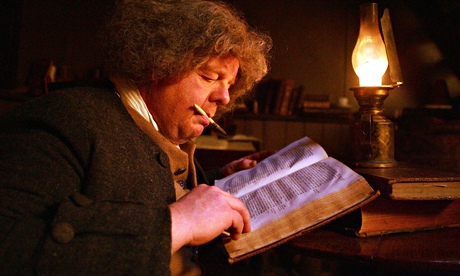
As Christmas heaves into view and we try once again to convince ourselves that we can eat, drink or otherwise consume our way to happiness, reading Samuel Johnson’s Rasselas should be obligatory. Originally titled The Choice of Life, Johnson’s wonderfully wily and energetic tale reminds us – like hangovers, bloat and post-Christmas blues – that happiness may just be a little more elusive than we think.
Johnson wrote Rasselas in a week in January 1759 to raise money for his gravely ill mother. But the speed of composition, and the melancholy circumstances, seem only to have quickened and compressed his formidable wits. Although it begins like a slice of neo-classical sermonising, in a few deft lines it erupts into irresistible life. “Ye who listen with credulity to the whispers of fancy … who expect that age will perform the promises of youth … attend to the history of Rasselas, Prince of Abissinia.”
Small it may be, this condensed prose masterpiece, and a little neglected these days, but its influence is not easily exaggerated. Anyone with an ear for the accommodating ironies of the English novel, for that laughing and loving doubleness that runs through Austen and Eliot and onwards, will find a progenitor in Rasselas. Johnson’s ancient and perennial theme is the search for a good life – a search we are all still embarked upon, whether we see it that way or not – and he writes in vigorous and surging prose, declamatory yet questioning, authoritative yet self-interrogating, always working toward a clearer view of things through doubles, paradoxes and inversions.
The young Rasselas was confined, according to Abissinian custom, to a “happy valley” – a place in which “all the delights and superfluities” of life were provided for until the time came for him to assume the throne. In step with the tale’s governing ironies, the book begins with Rasselas maundering in his happy valley, miserable amid plenty for want of the contrast that would give it flavour. Told by his friend Imlac that if he had seen the miseries of the world he would value his current state, he replies: “Now you have given me something to desire: I shall long to see the miseries of the world, since the sight of them is necessary to happiness.”
Freed from the rocky confines of the valley, Rasselas and his companions avidly seek out competing versions of the good life, splitting up to divide the task between them. “Hast thou found happiness?” is always the question, “tell me without reserve”. They visit a stoic philosopher, a man “who, from the unshaken throne of rational fortitude, looks down on the scenes of life changing beneath him”, only to find him, a few days later, inconsolable from the death of his daughter. They seek out the “innocence and quiet” of pastoral but find the hearts of shepherds “cankered with discontent”. Wealth provokes the envy of the powerful; the hermit in his cave has “lost so much [and] gained so little”. Marriage, that traditional refuge, “has many pains, but celibacy has no pleasures”.
Anyone who knows something of Johnson’s vicious struggles with mental illness will see them echoed in the astronomer. A man of great virtue and profound learning, he has spent 40 of the best years of his life star-gazing. But insidiously the mists of delusion have settled on him. For five years, he says, nature has granted him control of the world’s weather. Entirely alone with his delusion, exhausted and terrified by his self-assumed burden, his mind has consumed itself.
Johnson is well known for coining some of the gloomiest aphorisms in the language. “Human life,” says Imlac, “is everywhere a state in which much is to be endured and little is to be enjoyed”. But although, at the level of the sentence, Johnson can be dismayingly sharp – as well as wonderfully funny – it is the plot that reveals his heart. For at the end of this brisk and wonderful tale, the astronomer regains his reason, Rasselas’s sister, Pekuah, retrieves her companion from kidnap, and, in the conclusion, in which nothing is concluded, the four travellers sit out the Nile’s inundation diverting themselves with tales of what they have seen.
So does Rasselas or Johnson, have any final message for us? Probably not. Nature, says the Princess, “sets her gifts on the right hand and on the left … as we approach one we recede from another”. Paradox is at the heart of things. But we are not left hopeless. For in that inconclusive conclusion, we see a wiser group of friends gathered in seasonal confinement, ready, when the waters recede, to rejoin the stream of life. Accept change; “do not suffer life to stagnate”; avoid taking yourself too seriously – “you are but one atom of the mass of humanity”, after all - and learn, in so far as you can, to love your companions. Not such a terrible Christmas message after all.

